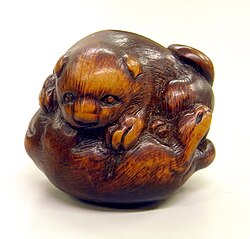根付
Appearance
Japanese
[edit]
Etymology 1
[edit]| Kanji in this term | |
|---|---|
| 根 | 付 |
| ね Grade: 3 |
つ(け) Grade: 4 |
| kun'yomi | |
| Alternative spelling |
|---|
| 根付け |
Compound of 根 (ne, “root, base”) + 付け (tsuke, “attachment, attacher”), the 連用形 (ren'yōkei, “continuative or stem form”) of verb 付ける (tsukeru, “to attach”, transitive), from the way the netsuke was attached to the end of the drawstring of a coin purse or pouch to prevent the drawstring from slipping through one's 帯 (obi, “sash, belt”).[1][2]
See the 提げ物 (sagemono) entry for an illustration of how netsuke were used.
Pronunciation
[edit]- (Tokyo) ねつけ [nèts
úké] (Heiban – [0])[2][3][4] - (Tokyo) ねつけ [nèts
úkéꜜ] (Odaka – [3])[2][3][4] - IPA(key): [ne̞t͡sɨ̥ke̞]
Noun
[edit]- a netsuke: miniature sculptures that serve as a fastener for a sagemono (a pouch, like a coin purse, tobacco pouch, or pillbox).
Coordinate terms
[edit]Etymology 2
[edit]| Kanji in this term | |
|---|---|
| 根 | 付 |
| ね Grade: 3 |
つ(き) Grade: 4 |
| kun'yomi | |
| Alternative spelling |
|---|
| 根付き |
Compound of 根 (ne, “root, base”) + 付き (tsuki, “attaching”), the 連用形 (ren'yōkei, “continuative or stem form”) of verb 付く (tsuku, “to attach”, intransitive).[1][2]
Pronunciation
[edit]Noun
[edit]- rooting
- a rooted plant
- short for 根付き魚 (netsuki uo): a non-migratory fish that lives among the roots of seaweed or coral
References
[edit]- ↑ 1.0 1.1 Shōgaku Tosho (1988) 国語大辞典(新装版) [Unabridged Dictionary of Japanese (Revised Edition)] (in Japanese), Tōkyō: Shogakukan, →ISBN
- ↑ 2.0 2.1 2.2 2.3 2.4 Matsumura, Akira, editor (2006), 大辞林 [Daijirin] (in Japanese), Third edition, Tokyo: Sanseidō, →ISBN
- ↑ 3.0 3.1 NHK Broadcasting Culture Research Institute, editor (1998), NHK日本語発音アクセント辞典 [NHK Japanese Pronunciation Accent Dictionary] (in Japanese), Tokyo: NHK Publishing, Inc., →ISBN
- ↑ 4.0 4.1 Yamada, Tadao et al., editors (2011), 新明解国語辞典 [Shin Meikai Kokugo Jiten] (in Japanese), Seventh edition, Tokyo: Sanseidō, →ISBN
Categories:
- Japanese terms spelled with 根 read as ね
- Japanese terms spelled with 付 read as つ
- Japanese terms read with kun'yomi
- Japanese compound terms
- Japanese terms with IPA pronunciation
- Japanese lemmas
- Japanese nouns
- Japanese terms with multiple readings
- Japanese terms spelled with third grade kanji
- Japanese terms spelled with fourth grade kanji
- Japanese terms with 2 kanji
- Japanese short forms

